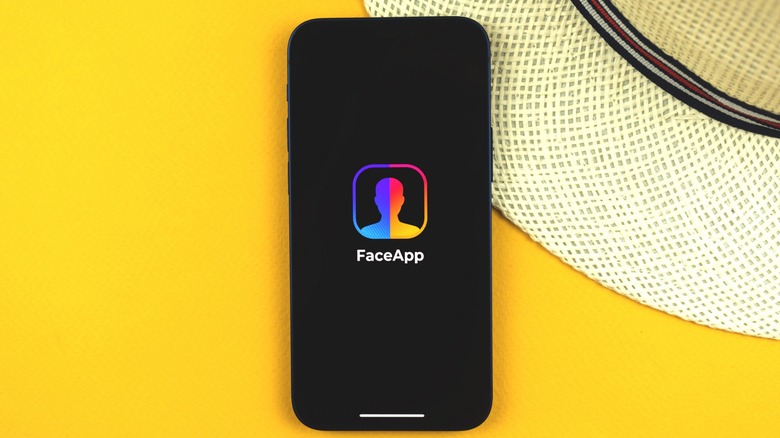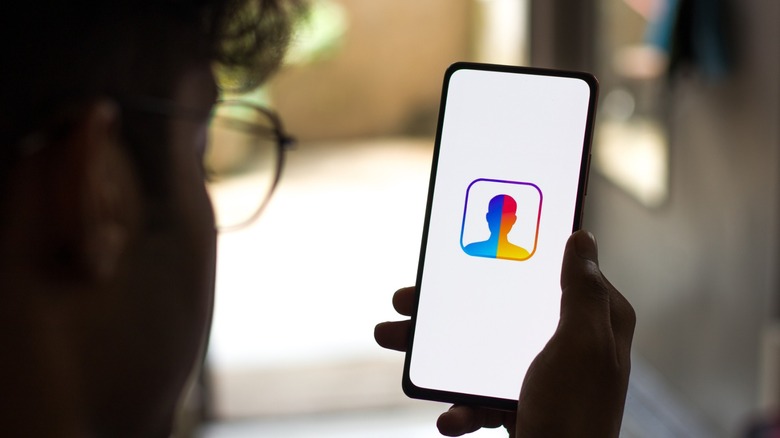
FellowNeko/Shutterstock
In today’s digital age, concerns over data and privacy are more relevant than ever. With massive data breaches like the recent AT&T data leak, concerned outcries over who has access to our data and how they plan to use it got so loud that the U.S. House of Representatives passed a bill to ban TikTok in March. That bill was moved forward and signed by President Biden in April, but TikTok is not the only app that has people feeling concerned over their data. Apps like FaceApp, the image editing and face-tuning software that has filters to make you look like anything from an older person to a pixie, also had its controversy back in 2019.
Advertisement
Back then, Senator Chuck Schumer expressed concerns over potential connections between the app and the Russian government. While subsequent reporting would find no connection between the app and Vladamir Putin’s regime, concerns over the safety of uploading an image of your face to the app remain today. Controversies surrounding its terms of service and privacy policy likely still have people avoiding it, with a lingering doubt whether the app is safe to use.
FaceApp claims to only use content for editing

GaudiLab/Shutterstock
According to FaceApp’s current privacy policy, FaceApp does not use photos or videos taken with the app for any other reason other than for the «editing functionality» of the app. The company has made it a point to state that the only time your images or videos are stored on a cloud server is while editing the media and for 24-48 hours to provide easy access for re-edits. That said, according to FaceApp’s Terms of Service, creating content using the app gives FaceApp a «nonexclusive, sublicensable, royalty-free, worldwide, fully paid license to use, reproduce…» and it goes on from there.
Advertisement
Essentially, looking past the legal jargon, it means that while you still own the rights to the content you create using the app, you also give FaceApp the right to reuse that content with a royalty-free license. From here, the terms get a bit more confusing, but the above applies to any content you select, post, publish, or display via text and email. Again, while the app does state that its purpose for these terms is to deliver «Services,» the somewhat confusing verbiage leaves it undetermined what exactly FaceApp could or would use your content for outside of providing editing software.
FaceApp can share information with third parties and service providers

Peter Dazeley/Getty
The stipulation on pictures and videos you take on FaceApp does not extend to other data. Like many modern apps, browsing and device data is shared with advertisers to show catered ads that you are more likely to interact with. Although the company claimed in a 2019 TechCrunch article that it doesn’t «sell or share any user data with any third parties,» its current privacy policy states that it would technically have the ability to do so, and it’s unclear whether the company still takes the same stance today that they took in 2019.
Advertisement
According to its current privacy policy, when using FaceApp, the app may collect data, including your app usage and other online activity, to provide to service providers, advertising partners, and other third parties. This collecting and sharing extends to device data, such as geographic location, Google and Apple advertising IDs, IP addresses, and other basic device data. It also covers contact information, including name and email address. Again, it’s important to note that this isn’t totally out of the norm for many apps on your phone.
For a point of comparison, TikTok’s Privacy Policy is arguably even further reaching, granting specific rights to TikTok to use user content as part of advertising and marketing campaigns. Indeed, it’s more than possible that a series of apps you use every day to document or take images or videos of your life can be used in the same manner and don’t contain caveats around content usage in the verbiage of its privacy policy or ToS.
Advertisement
So, is FaceApp actually safe to use?

sdx15/Shutterstock
The question of whether FaceApp or any app that captures the small details of your face is safe to use is sadly a more complicated and subjective topic than one would think. FaceApp doesn’t come packaged with any malware or harmful software that would hurt your device, but there have been concerns raised about the app and its origins. Concerns over rumored connections with the Russian government and user content stored on the cloud caused Senator Chuck Schumer to send a letter to the FBI expressing concerns over the app.
Advertisement
Reporting from The Washington Post in June of the same year claimed that, according to technical experts, concerns «appeared to have been overblown,» with no evidence surfacing that the company has ties with the Russian government. Still, other dissenting opinions raise concerns regarding the app’s arguably oppressive terms of service and content usage rights. Lastly, there’s always the potential that FaceApp will be acquired, and the data on the app will go over to a new company that can set new terms and use the data differently.
Data handled on FaceApp goes through Amazon Web Services (AWS) and Google servers in the U.S., though the company itself is now based out of Limassol, Cyprus, an island located just north of Israel. Yaroslav Goncharov, CEO of the company, also started Wireless Lab, a research-and-development company based in St. Petersburg. In the end, FaceApp is as safe to use as any other app that aggregates your data and is headquartered outside of the United States, which is ultimately a matter of opinion.
Advertisement